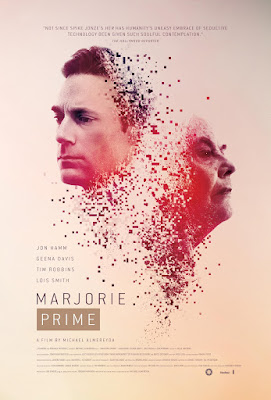It's the future, right, so this must be sci-fi? Yes, but writer/director Michael Almereyda has more on his mind than space ships, aliens, replicants or time travel. His latest film (his last one, the personal-history/documentary, Escapes, just opened a few weeks back), MARJORIE PRIME, is more concerned with the way we use the latest technology we're given, and then -- as in Spike Jonze's wonderful Her, and the British TV Black Mirror segment, Be Right Back -- goes just a few steps beyond where we currently find ourselves and into quite a new world. This world looks a lot like our own, yet allows us to do so much more -- the end results of which are both helpful and maybe not so. With new technology comes new challenge.
In my last review of Mr. Almeyerda's work, I noted how empathetic this director, pictured at right, so often is. Here, that empathy extends to the "Prime" of the title (there are, it turns out, a number of these). A "Prime" is a kind of holographic creation of a recently deceased person, whom those left behind -- wife, husband, daughter, whoever -- can use to assuage the grief, guilt and any of those many feelings/problems that remain unresolved once a loved one has died. The first Prime we meet in the film is Walter, Marjorie's late husband, embodied here by actor Jon Hamm (shown at left, above and below), as a younger version of the man. Marjorie herself (played by Lois Smith, shown at right, above and below) is now aged and suffering from off-and-on dementia.
The film's other leading characters are Marjorie's adult daughter (Geena Davis, below) and her husband (Tim Robbins, further below), who clearly have mixed feelings about this use of a Prime, even if, as it does indeed appear, this is helpful to mom.
Almereyda, who both wrote and directed, gives us movies that are always intellectual feats. This one is just such a film -- and even more so than usual, I would say. It is supremely elegant and quiet, full of discussion about the uses and mis-uses of memory, along with how it works. Characters' memories allow us to see flashbacks of certain important moments, as well as to better understand the ongoing relationship between these four people, one of whom, Walter, exists almost only as a Prime.
Along the way, two other characters also become Prime, which makes for some surprise and further investigation (of mortality and grief, among other things). In Jonze's Her, the "machine" develops feelings, personality and much else that we might call human. Almereyda's Primes seem to do so, as well, but on a much less obvious scale and manner.
While the filmmaker and his creations are subtle and never push for our sympathy, they do empathize with our human feelings and failings -- and very well, too. Yet the film itself is rigorously unsentimental.
The performances are striking, intensely specific and deeply felt. The ensemble works beautifully together, keeping us ever on our toes as we watch and listen intently, calibrating who these people are -- both humans and their Primes -- and how much the latter are becoming, or at least mimicking quite beautifully, the former. All the actors are terrific, but Mr. Robbins, ever under-rated, is as good here as I have seen him.
The movie's final scene is one of great beauty, sadness, and surprise. You will wonder at it in both amazement and acceptance. Almereyda, like Jonze, seems non-judgmental (hence, perhaps, his great empathy), and unlike Black Mirror's Charlie Brooker, he does no finger-wagging. In any case, he has come up with one of the most unusual films of the year -- a must-see, I think, for thinking audiences.
From FilmRise and running 97 minutes, Marjorie Prime opens this Friday, August 18, in New York City at the Quad Cinema, in the Los Angeles area at Laemmle's Playhouse 7 and Monica Film Center, in San Francisco at The Roxie, in San Rafael at the Smith Rafael Film Center, and in Arlington, MA, at the Regent Theater. The following Friday, it will open in another ten venues. Click here (then scroll down) to view all currently scheduled playdates, theaters, and cities.













No comments:
Post a Comment